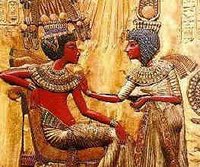
Did you hear the one about Nelson Mandela, the pope, Mother Teresa and the Jew? Turns out they are the only non-Americans ever to have received both the Presidential Medal of Freedom and the Congressional Medal of Honor. The Jew? None other than our own icon of freedom, Natan Sharansky, the former refusenik and prisoner of conscience who earlier this month received his Medal of Freedom at the White House.
I first met Natan in London a couple of years ago. He was on his way back from the U.S. where his new book, The Case for Democracy, had been highly acclaimed. Sharansky saw the world divided between “free societies and fear societies” and said that free nations did not normally go to war against each other.
He concluded that no Israeli peace agreement was viable until the Palestinian Arabs were truly free to live their own lives, freed from tyrannical overlords who have perpetuated their refugee status for political ends through intimidation and theft of humanitarian funds (dispensed by the U.S. and EU at the highest rate per capita ever known in the history of world aid).
One of the book’s greatest fans turned out to be no less than the president of the United States, who was so impressed that he asked Sharansky to meet him at the White House. This was no social call. They sat talking in the Oval Office for more than an hour, after which Bush emerged saying that Sharansky’s thinking was “part of my presidential DNA.” In a later interview with the Washington Times he said: “If you want a glimpse of how I think about foreign policy, read Natan Sharansky’s book.”
To say I felt humbled by pouring a glass of wine for this man over dinner in London is an understatement. But after we said our goodbyes, I had a very strong sense of déjà vu. Not of the person, but of his amazing story:
A man sentenced to 13 years in the Gulag for little more than expressing his national feelings as a Jew; man who showed such enormous resolve and charisma during that imprisonment that he endeared himself to his jailers and his name became known far beyond the walls of his prison. And then, suddenly freed, he emerges from the depths of a prison cell into the lofty chamber of the most powerful man in the world. The president of the free world wants to learn more of this man’s unique take on tyranny and the means by which to achieve peace.
“Behold! Can one find such a man in whom the spirit of God rests?”
I thought of those words Pharaoh spoke after his meeting with Joseph, another gifted Jew delivered up from a dungeon into the palace of the supreme ruler. Joseph discerned that Pharaoh’s dreams were of critical national significance. He urged Pharaoh to make the most of the next seven good years, so that the nation might survive the following years of certain adversity. Pharaoh took the advice and, with the help of his new Jewish viceroy, Egypt emerged more powerful than ever before, having starved all its enemies into submission and penury.
George W. Bush also had a nightmare – 9/11. In the aftermath of the attacks, his popularity was such that reelection was a certainty. At that point in time he had seven years of presidential power to defend the free world against the global jihad that would surely follow.
For most of that time Bush did show the resolve and single-mindedness necessary to carry the mission through. He bombed the Taliban out of Afghanistan, chased Saddam into a foxhole and threw the Syrian army out of Lebanon. Other tyrants took cover and one, in Libya, actually decided to go straight.
But then the president blinked. And in these past few weeks we have seen the tyrants sensing that weakness and boldly breaking cover with little fear of consequences. The Iraq Study Group has asked the leader of the free world to negotiate the fate of Iraq’s nascent democracy with two of the most evil regimes on the planet. To someone whose DNA is made up of Sharansky’s ideals, such a reversal would be akin to injecting oneself with an auto-immune disease. Iran and Syria are the perfect examples of Sharansky’s “fear societies” and the antithesis of democracy and freedom.
George Bush still has another two years left in the most powerful office on earth. Two years that can either glorify his place in history or leave it utterly sullied. But at the end of those two years there will be an election and another parallel in biblical history.
“And there arose a new king over Egypt, who knew not Joseph.”
That single verse marked the end of Egypt’s glory days, an era that had been inspired by a Jew brought forth from a dungeon. And – with the same divine help – it would be another Jew by the name of Moses who would bring the once mighty nation to its knees and see Pharaoh and his army drown in the sea.
 The next two crucial years will determine if George Bush will be remembered as a Chamberlain or a Churchill. We can only hope he makes the right choices.
The next two crucial years will determine if George Bush will be remembered as a Chamberlain or a Churchill. We can only hope he makes the right choices.
But whoever arises in 2008 will need to have known Joseph.
And also Natan.
_______________________________________________
This article first appeared as an Op-Ed in the Jewish Press
Labels: bible, bush



 The next two crucial years w
The next two crucial years w


<< Home